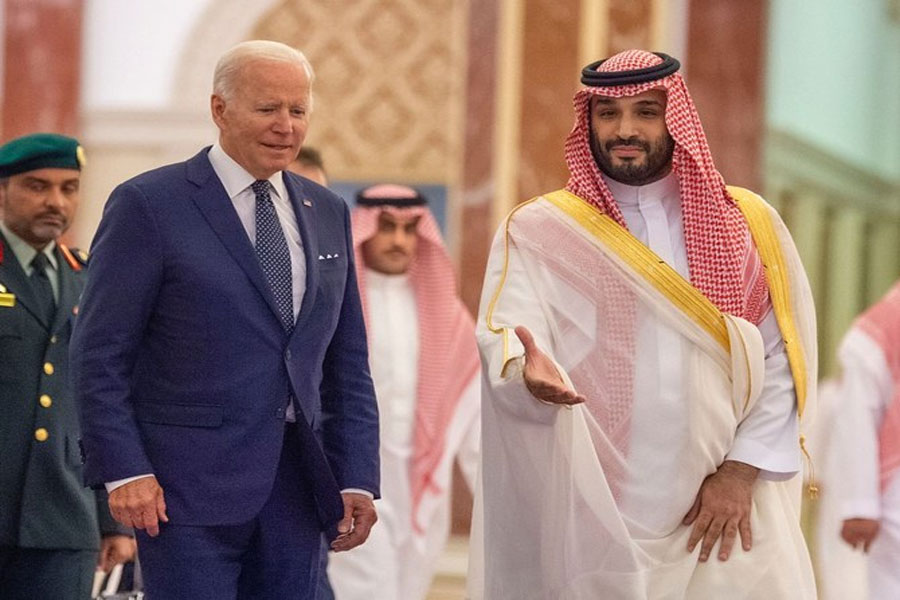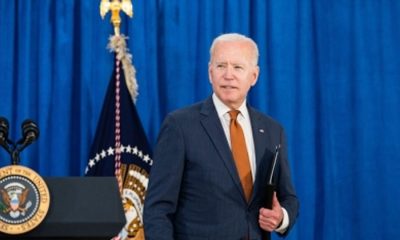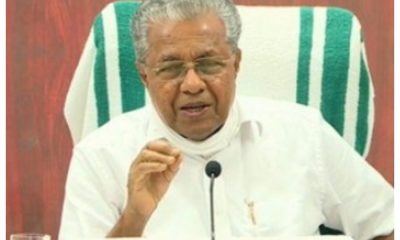International News
Biden’s tour de Saudia Arabia

Joe Biden’s west Asian tour should have been utilised to reset the American ties with different regional players and lay foundations for a more robust engagement but the results seem to be rather disappointing.
American President Joe Biden was on a four-day trip to Israel and Saudi Arabia, his first trip to the Middle East since taking office last year, with a lot of expectations about resetting the ties with Saudi Arabia and also giving a new direction to US policies in the Middle East.
The visit started with meetings in Israel to expand security ties and discuss Iranian belligerence in the region. He next went to Jeddah, Saudi Arabia, where he attempted to reassure regional leaders – and the rest of the world – that his administration remains committed to actively engaging in the Middle East and
counter any Russian or Chinese plans to expand their geopolitical influence.
US-Saudi ties
Coming in the backdrop of the continuing Russia-Ukraine war and spiralling global oil prices, the visit was also seen as a rapprochement by the US President to the Saudi Crown Prince Mohammad bin Salman (MbS), whom he blamed for the assassination of Saudi journalist Jamal Khashoggi, and thus pave the way for softening the Saudi stance on increased oil production.
However, the manner in which the two leaders greeted each other with a fist bump has been criticised both by fellow Democrats and Republicans, due to its undiplomatic nature and also as a middle ground to thaw the ice, perhaps on the advice of their key lieutenants.
Also the version given by Biden and Saudis as to whether the President admonished MbS seem to vary, thus indicating that the President was ready to give up his old stance for the Saudi agreement to increase its oil production, though ultimately he got no such assurance.
The meetings in Jeddah largely seemed to go along with the planned reset of the US relationship with the kingdom, and Biden announced several new areas of cooperation aimed at reshaping US-Saudi relations.
However, the President did strike an optimistic note that regional leaders would soon take action given that the next OPEC meeting will take place in early August, after his parley with the Gulf Cooperation Council (GCC) leaders in Riyadh.
US-Iran Ties
Biden is also under pressure to counter Iran’s growing influence in the region, and during the visit he made a commitment to the U.S. playing a large role in the Middle East for years to come.
In Israel, Biden repeatedly vowed to ensure that Iran does not acquire a nuclear weapon and said he believed diplomacy remained the best avenue to keep Tehran from obtaining one.
Biden has pushed for a revival of the Iran nuclear deal, which former president Donald Trump withdrew the US from in 2018, as he faces increasing pressure from key Middle East allies to produce a plan to contain Iran. But hopes appear to be fading that a deal will materialise, and the President acknowledged that the US is not going to wait forever; for a response from Iranian leadership.
US-Israel ties
America’s relationship with Israel has also been strained in recent years. Obama and former Israeli President Benjamin Netanyahu shared a strained relationship over Palestine, and the 2015 nuclear deal with Iran also soured the relations.
But the Biden administration’s renewed efforts to re-implement the Iran nuclear deal, coupled with warnings over Israel’s expansion of settlements in the West Bank, have further complicated US-Israeli relations again.
In addition, US is also worried about the growing Russian and Chinese influence in the region. Iran has cosied-up to Russia significantly in recent years and the Chinese have made themselves more useful both to the Saudis and Emiratis in defence and trade sectors.
The new approach
His critics say that Biden to an extent continued with the old American baggage. And if he really wants to rest the American foreign policy for West Asia and its Arab allies, it will have to adopt a more proactive and less preaching stance with a new perspective, too.
Biden himself said during the trip that he continues to believe that diplomacy is the best way to achieve a new outcome. But to achieve that outcome, he’ll have to pursue soft-diplomacy also.
Additionally, the US should try to give-up the mentality to solve every problem or conflict with military means and tactics, instead it should try to focus and see the alternative opportunities available to help the people of the Middle East achieve greater freedom and prosperity which they desire.
For this, the renewed American focus should prioritise its interests through better security management for itself and its allies. Ensuring that terrorist threats from the Arab world should remain a focus of US engagement in the region.
Further, it should focus on economic welfare of the region. The Middle East’s energy resources remain critical to the global economy. In addition, the US should try to foster lasting economic ties with emerging centres of innovation in the region.
Additionally, it should focus on values and rights, which the United States supports i.e. religious freedom, women’s rights, and freedom of expression.
These should be promoted through its soft diplomacy or public diplomacy channels. There is a huge aspiration amongst the people of the region to fill-up the chasm between what is available and what they wish for, ensuring dignity and prosperity for all.
At the same time, it should try to engage more with the young generation amongst the Arabs, the 13 th edition of the Arab Youth Survey found that over 90 per cent of Saudi youth, who form nearly two-thirds of the country’s population, see the US as an ally. This should be its target audience.
It should focus on boosting bilateral ties in new areas such as tourism, information technology, and clean energy and focus less on energy sector.
It should launch joint initiatives on human security challenges such as in the health sector, economic security, human rights, and climate change. It should engage in renewed diplomatic efforts to end conflicts in Syria, Yemen, and Libya.
It should try to contain and engage Iran with diplomacy backed by a balanced regional security strategy.
Renewed diplomacy with Iran must include America’s regional security partners in order to produce lasting results. It should strive for greater regional integration with renewed and inclusive diplomacy on the Arab-Israeli front, too.
Overall, the visit failed to accomplish what Biden wanted to achieve in the region, and for any success the US will have to fully recalibrate its policy towards the Middle East, Iran and Israel in the short-term for long-term gains and keeping the Russians and Chinese at bay in the region.
(Asad Mirza is a political commentator based in New Delhi. He writes on Muslims, educational, international affairs, interfaith and current affairs. The views expressed are personal)
Crime
ISI fans anti-India narrative in Bangladesh to rig Feb polls: Intelligence inputs

New Delhi, Dec 25: The ISI’s role in attempting to fan an anti-India sentiment in Bangladesh is most certainly confirmed, given the rhetoric by some Pakistan news outlets and a few leaders. Some media outlets have recklessly blamed India’s Research and Analysis Wing (RAW) for the murder of student leader Sharif Osman Hadi. The claim has been made at a time when the Bangladesh authorities themselves are unclear about the killers and their motive.
Adding to the fire is a fiery video message by Kamran Sayeed Usmani, a leader of Pakistan’s ruling party, PML-N, who went on an anti-India rhetoric.
While blaming New Delhi for the mess in Bangladesh, he threatens that missiles would be directed at India. Officials say that these are reckless messages only aimed at ensuring that the violence continues in Bangladesh.
The official further pointed out that there is a pattern to such messaging. The intention is to internationalise the domestic problems in Bangladesh, and by dragging India into it, these elements are trying to achieve just that. Not a single country except Pakistan has blamed India for the mess that is on in Bangladesh. In fact, it was the Pakistan deep-state that orchestrated this mess by first ensuring that Sheikh Hasina was ousted and the Jamaat-e-Islami was in the driver’s seat. The international community is aware that the Jamaat is a puppet of the ISI.
Following the Liberation War, it was the ISI and Jamaat which planned large-scale illegal immigration into India so that demographic changes could be executed. Intelligence Bureau officials who are keeping a close watch on the developments in Bangladesh say that the ISI is playing two games here.
Pakistan has been desperately seeking revenge against India since it lost the 1971 war, which led to the creation of Bangladesh. Hence, there has been the manufacturing of a false narrative so that the people of Bangladesh are pitted against India.
The ISI realises that it would need a Jamaat government or one backed by it to be in power. Parties like the Bangladesh National Party (BNP) have been showing signs of moving away from the Jamaat and ISI, as the party wants a developed and not a radical nation.
The signs became clear when the BNP distanced itself from the Jamaat and decided to contest the elections on its own.
This shift has hurt the ISI and made it insecure, as the BNP does have every chance of winning the elections. Pollsters have predicted a win for the BNP in the absence of the Awami League, which has been banned from contesting the elections.
Former Prime Minister and BNP chief Khaleda Zia is unwell, and this could well be a sympathy factor for the party in the February 2026 polls. The BNP cadre will also be bolstered by the return of Zia’s son, Tarique Rehman, who is set to visit Bangladesh after 17 years in exile.
All these factors have made the ISI and Jamaat uneasy, and they feel that the elections can slip out of their hand.
Bangladesh watchers say that the elections are unlikely to be put off as pressure from the international community is building up. Experts say that the elections in Bangladesh are most likely to go as per schedule, but the fairness of it remains a question mark.
Intelligence agencies say that the violence is being fanned by the Jamaat-controlled groups so that the people do not come out and vote in large numbers. They want to create fear in the minds of the people so that they stay indoors when the elections are on.
Many Awami League supporters are unlikely to vote as the party is banned. Some are likely to shift their loyalties to the BNP, and if this does happen, then the party’s chances of winning the elections will only increase.
Analysts say that there is either a chance of a short postponement of the elections or a completely unfair one being conducted.
The ISI is doing everything possible to rig the polls by inciting violence. While trying to rig the polls, the ISI is also dishing out a false narrative to create an anti-India sentiment among the people.
Business
India-New Zealand FTA: PM Modi, Luxon aim to double bilateral trade over 5 years

New Delhi, Dec 22: Prime Minister Narendra Modi held a telephone conversation with New Zealand’s Prime Minister, Christopher Luxon, on Monday as the two leaders jointly announced the successful conclusion of the historic, ambitious and mutually beneficial India-New Zealand Free Trade Agreement (FTA).
During the conversation, both leaders expressed confidence in doubling bilateral trade over the next five years as well as an investment of $20 billion in India from New Zealand over the next 15 years.
The negotiations began in March this year and the two leaders concluded the FTA in a record time of nine months, reflecting the shared ambition and political will to further deepen ties between the two countries, according to a statement from Prime Minister’s Office (PMO).
“The FTA would significantly deepen bilateral economic engagement, enhance market access, promote investment flows, strengthen strategic cooperation between the two countries, and also open up new opportunities for innovators, entrepreneurs, farmers, MSMEs, students and youth of both countries across various sectors,” said the statement.
The leaders also welcomed the progress achieved in other areas of bilateral cooperation such as sports, education, and people-to-people ties, and reaffirmed their commitment towards further strengthening of the India-New Zealand partnership.
This historic FTA eliminates and reduces tariffs on 95 per cent of New Zealand’s exports – among the highest of any Indian FTA – with almost 57 per cent being duty-free from day one, increasing to 82 per cent when fully implemented, with the remaining 13 per cent subject to sharp tariff cuts.
It puts New Zealand exporters on an equal or better footing to our competitors across a range of sectors and opens the door to India’s rapidly expanding middle class, according to an official statement from New Zealand.
“The Indian economy is forecast to grow to NZ$12 trillion by 2030. The India-NZ Free Trade Agreement unleashes huge potential for our world-class exporters to the world’s largest country and will significantly accelerate progress towards New Zealand’s ambitious goal of doubling the value of exports over 10 years,” it added.
International News
‘Bodes ill for democratic process’: Tharoor flags attacks on media amid violence in Bangladesh

New Delhi, Dec 20: Congress MP Shashi Tharoor on Saturday voiced serious concern over what he described as targeted attacks on prominent media houses in violence-hit Bangladesh, while also condemning the forced suspension of visa services at Indian Assistant High Commissions in Khulna and Rajshahi amid worsening security conditions.
Bangladesh has witnessed a fresh wave of unrest following the death of radical Islamist leader Sharif Osman Hadi, who rose to prominence during the 2024 student movement that culminated in the ouster of the then Prime Minister Sheikh Hasina.
The killing has triggered widespread protests, with violence reported in Dhaka and several other parts of the country.
Protests over the death of Inqilab Moncho leader Hadi have continued to escalate, and the mobs targeted leading media organisations and locations associated with Bangladesh’s secular legacy. Reports of arson and vandalism at media establishments have sparked alarm both within the country and internationally.
Reacting to the developments, Tharoor said the attacks on the press strike at the core of democratic values.
In a post on X, he said: “Deeply concerned by the reports from Bangladesh. The targeted mob attacks and arson at the offices of Prothom Alo and The Daily Star are more than just an assault on two media houses; they are an assault on the freedom of the press and the very foundation of a pluralistic society.”
The Congress MP also expressed concern about the safety of journalists, including senior editors. He said he was worried about the well-being of Editor Mahfuz Anam and other media professionals working under increasingly hostile conditions.
Amid the unrest, India was compelled to shut down two visa application centres in Bangladesh, citing security threats. In Rajshahi, a march was organised by a group called ‘July 36 Mancha’ towards the Indian Assistant High Commission. The procession advanced towards the diplomatic mission but was halted midway following police intervention.
Similar demonstrations were also reported in Khulna, prompting authorities to suspend visa-related operations at both locations.
Condemning the disruption, Tharoor said the suspension of services would have far-reaching consequences.
“The forced suspension of visa services at the Indian Assistant High Commissions in Khulna and Rajshahi, driven by escalating security threats, is a major setback. This disruption directly impacts students, patients, and families who were finally seeing a glimpse of normalisation in cross-border mobility,” he said.
With Bangladesh scheduled to hold national elections on February 12, 2026, Tharoor warned that this atmosphere of violence and intolerance “bodes ill for the democratic process”.
The Congress leader also outlined steps for the Muhammad Yunus-led interim government to ensure stability and democratic continuity in the country.
Emphasising the need for decisive action, he said: “Protection of Journalists: Journalists should not have to post frantic messages for their lives while their offices burn. Mob rule must not be allowed to prevail.”
He further mentioned that the security of diplomatic facilities must be ensured to maintain vital people-to-people ties. “Extra protection must be provided for targeted embassies & consulates,” he said.
“Constructive dialogue must replace ochlocracy if the country is to survive this transition with any semblance of democracy. Interim Chief Mohammed Yunus must take the lead personally to ensure this,” he added, stressing the need to restore the calm.
Tharoor underscored that peace in Bangladesh holds significance beyond its borders, noting that stability in the country is “vital” for South Asia as a whole.
“We hope for a return to peace and a safe environment where the voice of the people is heard through the ballot, not through violence and intimidation,” he added.
-

 Crime3 years ago
Crime3 years agoClass 10 student jumps to death in Jaipur
-

 Maharashtra1 year ago
Maharashtra1 year agoMumbai Local Train Update: Central Railway’s New Timetable Comes Into Effect; Check Full List Of Revised Timings & Stations
-

 Maharashtra1 year ago
Maharashtra1 year agoMumbai To Go Toll-Free Tonight! Maharashtra Govt Announces Complete Toll Waiver For Light Motor Vehicles At All 5 Entry Points Of City
-

 Maharashtra1 year ago
Maharashtra1 year agoFalse photo of Imtiaz Jaleel’s rally, exposing the fooling conspiracy
-

 National News1 year ago
National News1 year agoMinistry of Railways rolls out Special Drive 4.0 with focus on digitisation, cleanliness, inclusiveness and grievance redressal
-

 Maharashtra1 year ago
Maharashtra1 year agoMaharashtra Elections 2024: Mumbai Metro & BEST Services Extended Till Midnight On Voting Day
-

 National News1 year ago
National News1 year agoJ&K: 4 Jawans Killed, 28 Injured After Bus Carrying BSF Personnel For Poll Duty Falls Into Gorge In Budgam; Terrifying Visuals Surface
-

 Crime1 year ago
Crime1 year agoBaba Siddique Murder: Mumbai Police Unable To Get Lawrence Bishnoi Custody Due To Home Ministry Order, Says Report




















